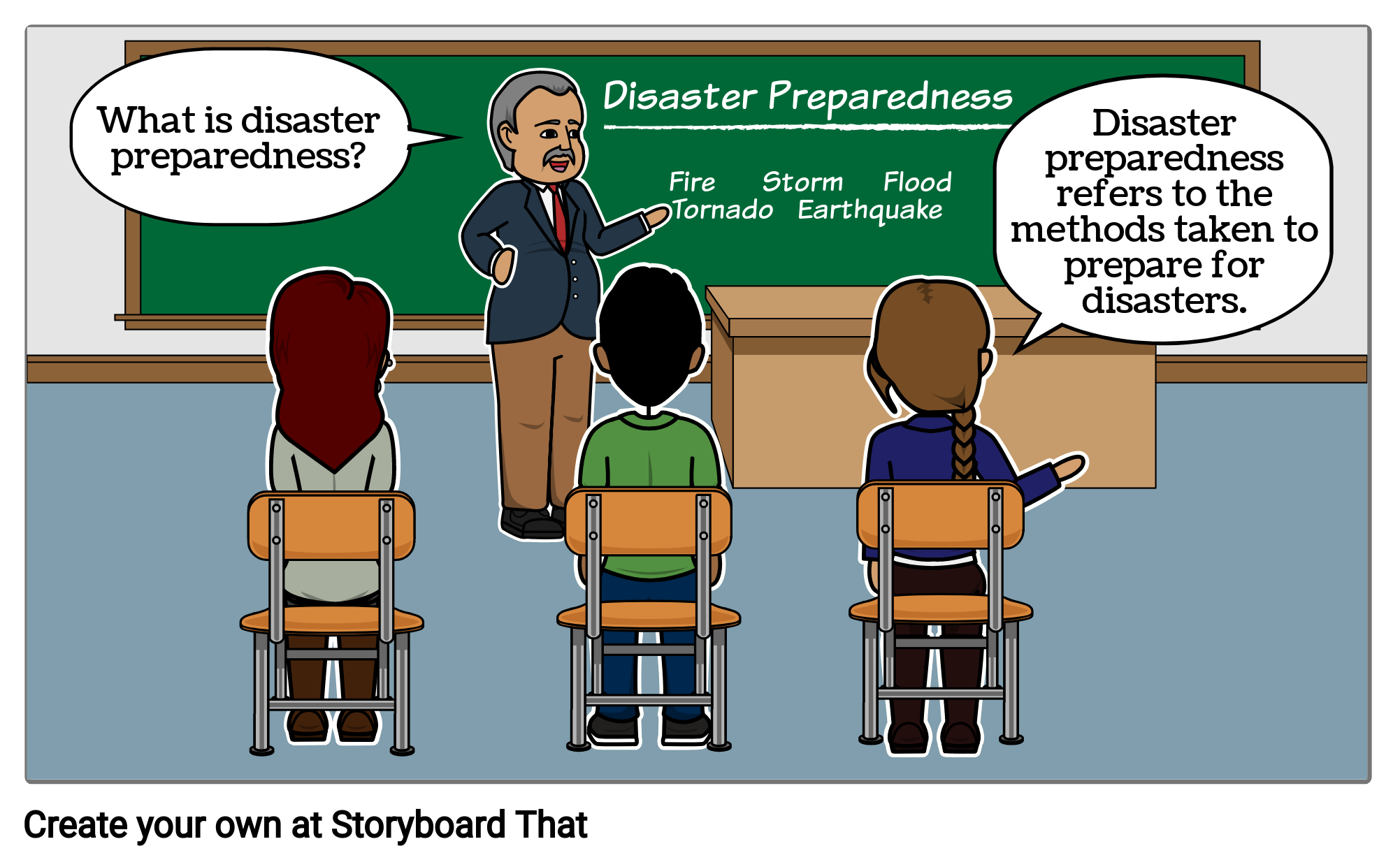LESSON GOAL
Let’s check our lesson goal.
In this material, you will learn the words and phrases when talking about
disaster preparedness and express your opinions about specific topics.
In this material, you will learn the words and phrases when talking about
disaster preparedness and express your opinions about specific topics.
この教材では、災害や防災の準備に関連した語彙や表現を学び、特定の話題について意見を述べる練習をします。
PART A_1
Please study the picture below. Then, describe it in as much detail as you can.
PART A_2

| Answer: | |
| . |
PART A_3
Now, let me ask you a question about the picture.
PART A_4
| 1. | What are some of the natural disasters? |
| Answer: |
PART A_5
Now, let us review your answers.
(Please review your student’s answers by sending the correct answers in complete sentences. After that, ask your student to read aloud his or her corrected answers.)
PART A_6
Choose the correct meaning of the underlined word in each sentence.
PART A_7
| 1. | The town was declared a disaster area after the floods. |
| a. | [noun] a very strong wind |
| b. | [noun] a sudden event that causes great harm or damage |
| c. | [verb] to travel or move to another place |
| 2. | Thousands of buildings collapsed during the earthquake. |
| a. | [noun] a sudden movement of the ground, often causing great damage |
| b. | [verb] to offer to do something that you do not have to do |
| c. | [noun] a written or spoken description of an event |
| 3. | We need a first aid kit in case of emergency. |
| a. | [verb] to be in the right place or a suitable place |
| b. | [noun] an extreme weather condition with very strong wind and heavy rain |
| c. | [noun] a serious situation that requires immediate action |
| 4. | We believe fire prevention is really important. |
| a. | [noun] a mass of cloud consisting of small drops of water near the surface of the earth |
| b. | [noun] an act of stopping something from happening |
| c. | [noun] an event not intended by anyone but which has a negative result |
| 5. | A tornado might hit this country. |
| a. | [noun] a strong, dangerous wind that looks like an upside-down cone |
| b. | [adjective] very important and needing attention immediately |
| c. | [noun] something or someone that may harm you |
PART A_8
Now, let us review your answers.
(Please review your student’s answers by sending the correct answers in complete sentences. After that, ask your student to read aloud his or her corrected answers.)
PART B_1
Please construct your own sentences using the following words.
PART B_2
| 1. | tornado | Answer: | . | |
| 2. | earthquake | Answer: | . | |
| 3. | emergency | Answer: | . | |
| 4. | disaster | Answer: | . | |
| 5. | prevention | Answer: | . |
PART B_3
Now, let us review your answers.
(Please review your student’s answers by sending the correct answers in complete sentences. After that, ask your student to read aloud his or her corrected answers.)
PART C_1
Please complete each sentence by choosing the correct answer in the box below.
PART C_2
| earthquake | storm | emergency |
| tornado | prevention | disaster |
| 1. | They are giving out ____________ supplies before a heavy storm hits the city. |
| 2. | The government has promised a full investigation into the __________. |
| 3. | ____________ winds sometimes occur in the west section. |
| 4. | There were multiple ____________ shocks last summer. |
| 5. | They will provide general guidance on fire ____________. |
PART C_3
Now, let us review your answers.
(Please review your student’s answers by sending the correct answers in complete sentences. After that, ask your student to read aloud his or her corrected answers.)
PART D_1
Let’s talk. Please answer the questions by stating your opinions.
PART D_2
| 1. | Some people say that it’s better to stay at home when a natural disaster happens. What do you think about that? |
| Answer: | |
| 2. | Every household should always have emergency supplies at home. Do you agree or disagree? |
| Answer: |
PART E_1
Now, I will ask you the following questions. You may ask questions, too.
PART E_2
| 1. | Does it flood in your area? |
| Answer: | |
| 2. | What do you think is the first thing to do when a disaster happens? |
| Answer: | |
| 3. | What is the most common natural disaster in your area? |
| Answer: | |
| 4. | What can you do to prepare in advance for a disaster? |
| Answer: | |
| 5. | What do you think are the most common problems after a natural disaster? |
| Answer: | |
| 6. | Do you think people should stay calm during a natural disaster? |
| Answer: | |
| 7. | Do you think the internet can be helpful during a disaster? |
| Answer: |
REVIEW AND FEEDBACK
Now, let us review the things that you learned in this lesson.
ではこのレッスンで学んだことを振り返りましょう。
(Please give a short feedback on how your student did on your class.)
| Grammar 文法 |
Pronunciation 発音 | Vocabulary 単語 |
Comprehension 理解 |
|
|---|---|---|---|---|
 GOOD GOOD |
文法の誤りはほとんどなく、完全な文章で話すことができる | ほとんどの単語をはっきりと正しく発音することができる | 習った表現を適切に使うことができる | 文章を理解し、質問に正しく答えることができる |
 FAIR |
文法の誤りはあるが、完全な文章で話すことができる | 発音の練習が必要な言葉がいくつかある | たまにミスはあるが、習った表現を適切に使うことができる | 文章を完全に理解するのは難しく、質問に正しく答えられないときもある |
 POOR |
文章で話すのは難しく、単語だけで話すことができる | 発音の練習が必要である | 習った単語と表現を少しだけ使うことができる | 文章を理解するのは難しく、質問に答えるのは難しい |
レッスン教材に関するアンケートのお願い
レッスン教材の改善・拡充を図ることを目的とし、アンケートを実施しております。
以下のURLからアンケートにお答えいただき、 ご意見・ご要望をお聞かせください。
アンケートはこちら